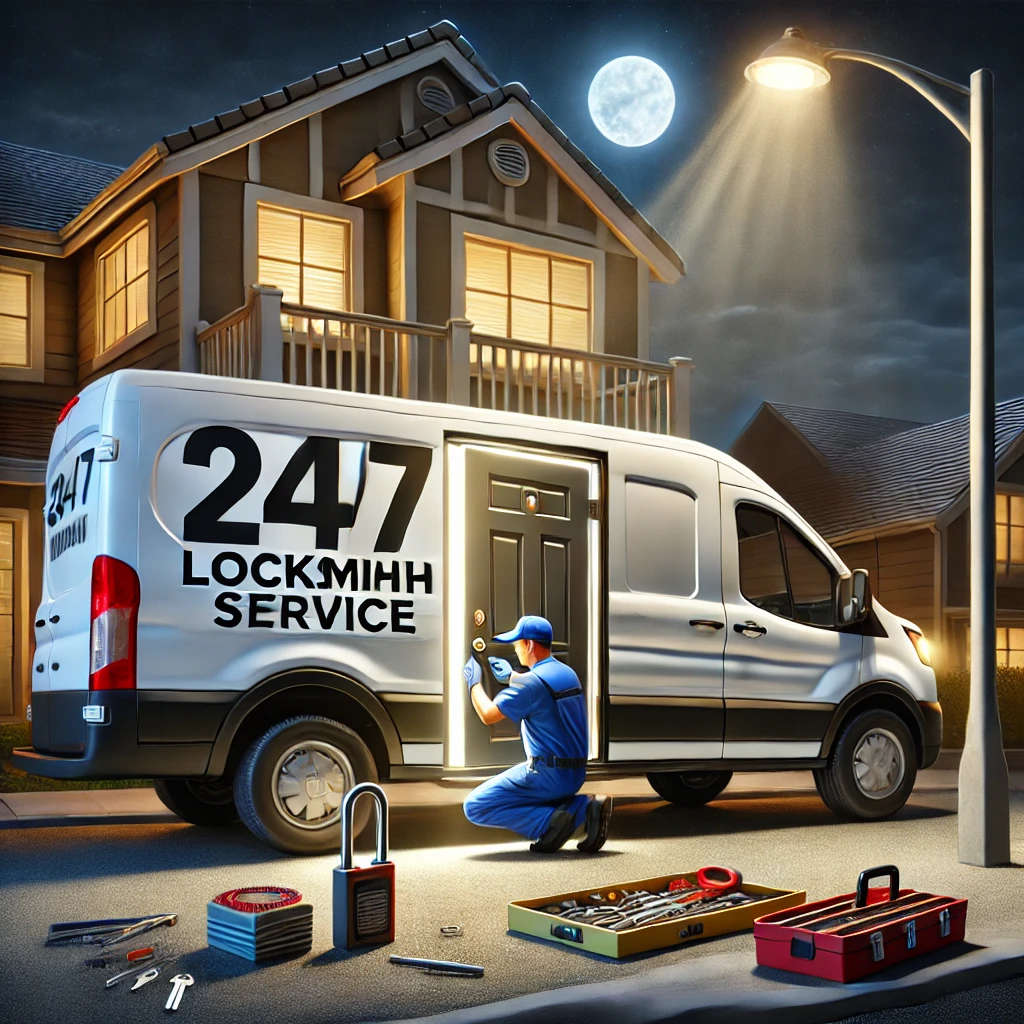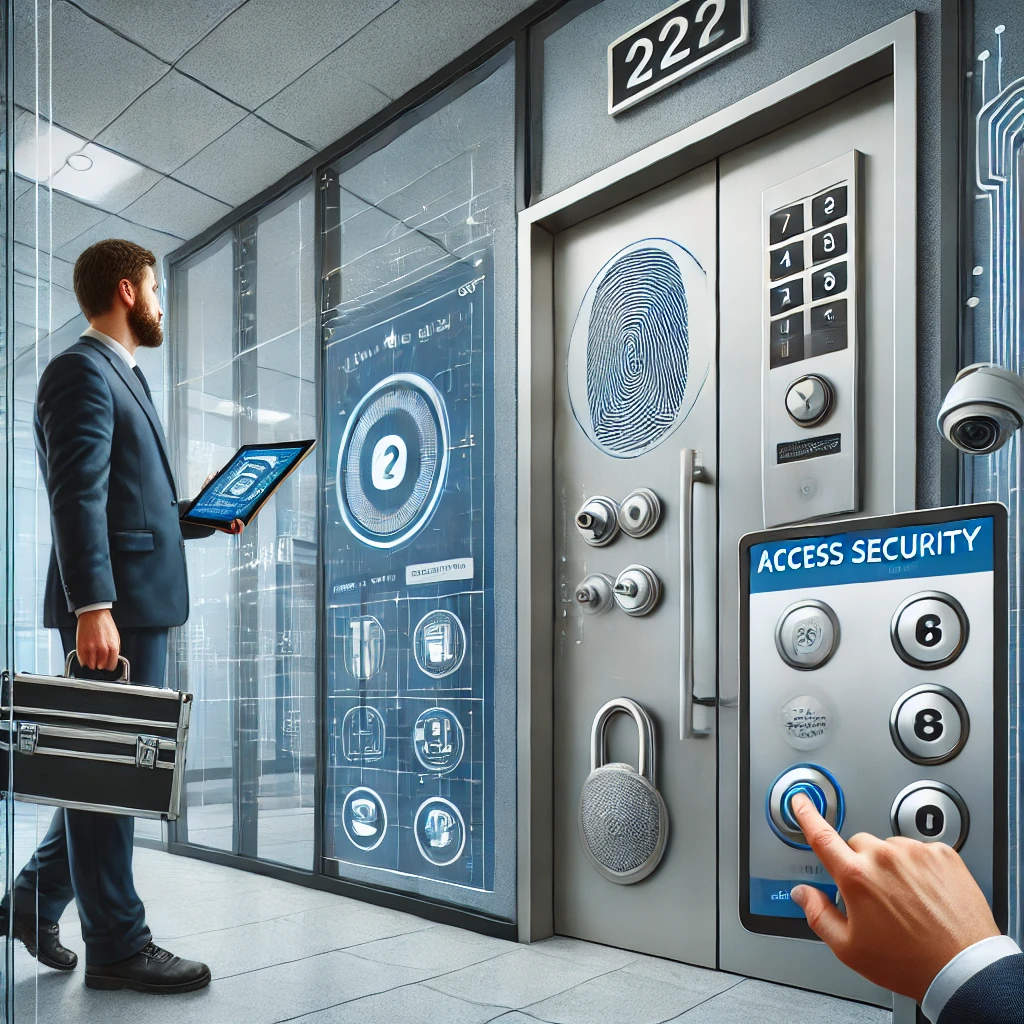The demand for 24/7 mobile locksmith services is at an all-time high. Customers increasingly rely…
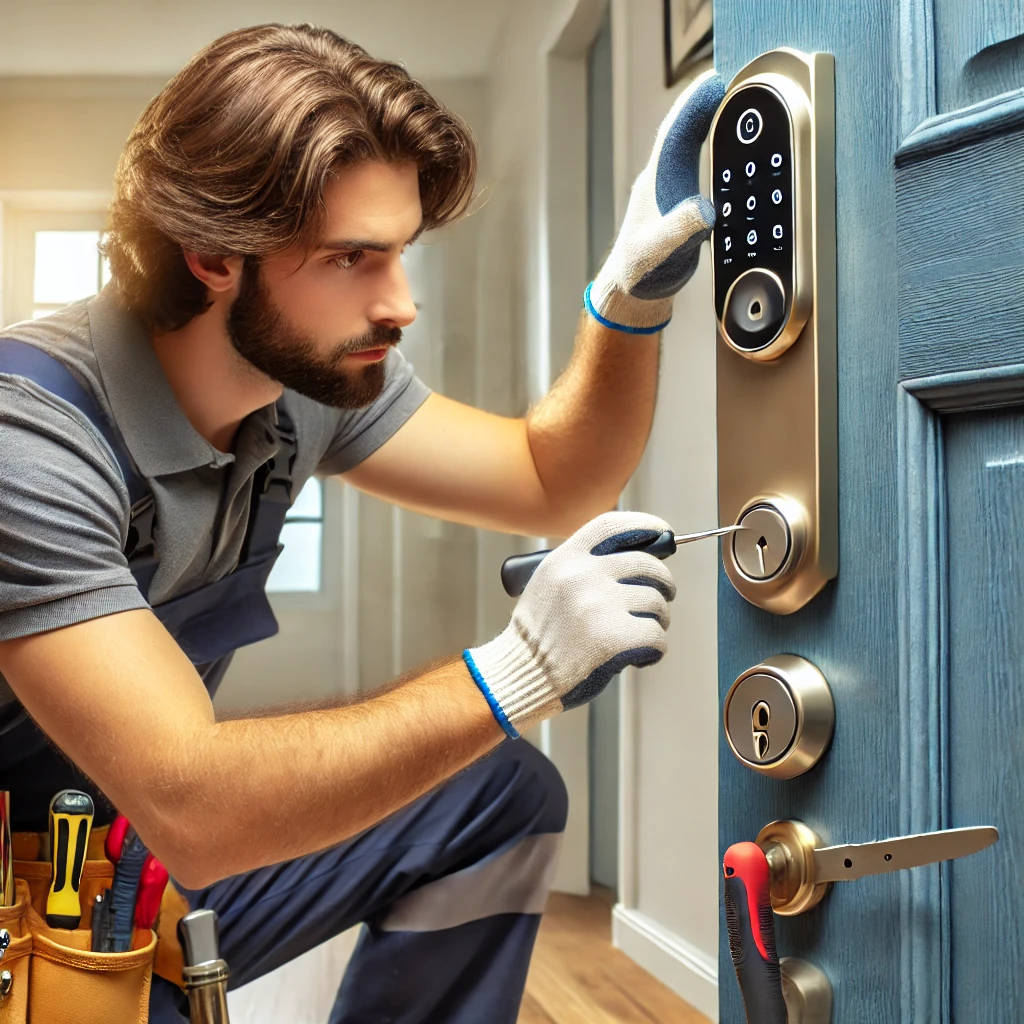
2025 Locksmith Trends: Innovation, Security, and Technology Integration
As technology advances, so too does the locksmith industry. In 2025, locksmiths are evolving beyond traditional lock-and-key services into a world where innovative technology, enhanced security, and convenience are at the forefront. Whether you’re a homeowner looking for cutting-edge smart locks or a business seeking advanced security systems, the role of locksmiths is rapidly changing to meet modern demands. From biometric locks to mobile access control, locksmiths must now be skilled technicians and technology integrators. This blog will explore the major trends and innovations to define the locksmith industry in 2025.


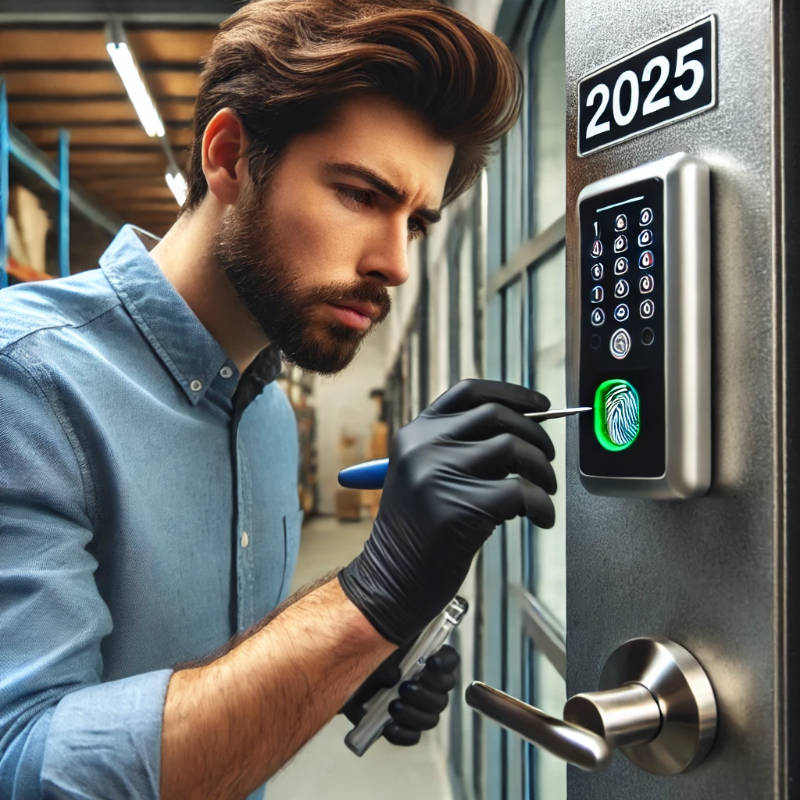
🎧 2025 Locksmith Trends: Innovation, Security, and Smart Technology
✨ This episode explores the latest trends in the locksmith industry, focusing on innovations, security, and smart technology for 2025. ✨
🎙️ Powered by iHeart Podcasts 📻
1. Smart Locks and Keyless Entry Systems in 2025 Locksmith Trends
The growing trend of smart home devices is transforming how locksmiths provide services. Smart locks, once considered luxury items, are becoming mainstream, offering homeowners and businesses the convenience of keyless entry. These systems are controlled by mobile apps, voice commands, or even biometric data, providing high security and flexibility.
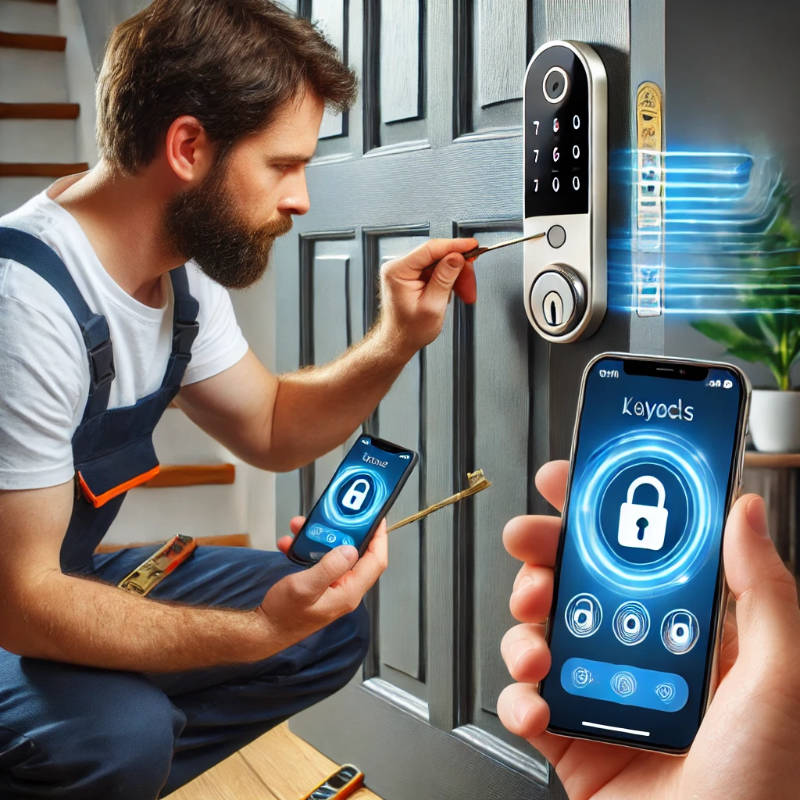
Key 2025 trends in smart locks:
- Biometric security: Fingerprint and facial recognition technologies are being integrated into smart locks, adding another layer of security beyond traditional methods.
- Mobile access control: Users can lock or unlock their homes and businesses remotely via smartphone apps, offering convenience for service providers, deliveries, and guests.
- Voice-activated systems: Smart locks are now compatible with digital assistants like Amazon Alexa or Google Assistant, allowing for voice-activated access.
For locksmiths, this trend means mastering smart home integrations and expanding knowledge in cybersecurity to secure clients’ connected devices properly.
2. 2025 Locksmith Trends: Commercial Access Control and Multi-Layered Security
Security has always been a priority in commercial settings, but in 2025, locksmiths will see significant growth in demand for multi-layered security systems in commercial and retail sectors. With increased foot traffic, high-value assets, and the rise of hybrid workplaces, businesses require more advanced access control systems to protect physical and digital assets.
Key Drivers of Commercial and Retail Demand:
Compliance with Regulations: Certain industries, such as healthcare and finance, are regulated by stringent security requirements. Locksmiths will be vital in helping businesses comply with these regulations by providing systems that offer secure, controlled access and detailed audit trails.
Rising Security Concerns: Retailers and commercial businesses face increasing threats, from theft to cyberattacks. With valuable data and goods at stake, companies invest heavily in integrated security solutions.
Foot Traffic Management: Retailers with high volumes need systems that manage customer and employee access, control sensitive areas, and ensure a seamless shopping experience.
Hybrid Work Environments: As companies embrace hybrid work models, physical offices create security gaps. Locksmiths will need to install systems that enable remote workers to access the site without compromising the security of those working on-site.
Key 2025 trends in commercial locksmithing:
- Integrated Access Control: Combining physical locks with digital security, locksmiths install systems that include card readers, biometric scanners, and security cameras, all controlled via cloud-based platforms for easy management and monitoring.
- Data-Driven Security Management: Businesses leverage data from access control systems to monitor traffic, detect anomalies, and adjust security measures dynamically. This allows for a more proactive approach to securing sensitive areas.
- High-Security Locks: Companies are increasingly investing in tamper-proof, pick-resistant locks and reinforced security doors for high-value areas such as stock rooms and data centers. These systems are integrated with other digital security measures to create a robust multi-layered defense.
Conclusion: In 2025, locksmiths will need expertise in both hardware and software as commercial clients demand sophisticated, integrated solutions that provide security, real-time monitoring, and data-driven insights. The growing demand for secure access control in commercial and retail sectors will drive innovation in locksmithing services.
3. Mobile Locksmithing Services in 2025 Locksmith Trends
Convenience is king in 2025, and locksmiths are responding by offering mobile locksmithing services. Equipped with vans outfitted with the latest tools and technology, mobile locksmiths can provide on-site key cutting, smart lock installations, and emergency services around the clock.
Key 2025 trends in mobile locksmithing:
- On-demand locksmithing apps: Like rideshare or food delivery apps, on-demand locksmith services are becoming a trend. These apps allow customers to summon a locksmith through mobile platforms for immediate assistance.
- 24/7 emergency services: With increased reliance on digital locks, people are prone to issues like system glitches or power outages, necessitating emergency locksmith services.
- Mobile key cutting: Portable key-cutting machines and intelligent key programming devices enable locksmiths to create or duplicate keys on-site, reducing delays and improving customer satisfaction.
Mobile locksmiths who invest in convenience-oriented solutions will stand out, offering clients a faster and more flexible service experience.
4. Eco-Friendly Locksmithing Practices
As industries shift towards sustainability, locksmiths are also embracing eco-friendly practices. In 2025, locksmith businesses will take steps to reduce their environmental footprint, from using sustainable materials in lock systems to optimizing routes for mobile locksmith services.
Key 2025 trends in eco-friendly locksmithing:
- Sustainable materials: Locks made from recyclable or eco-friendly materials are gaining popularity, appealing to environmentally conscious consumers.
- Energy-efficient locks: As part of smart homes, energy-efficient locks that reduce battery usage or integrate with renewable energy sources are becoming a trend.
- Green service operations: Locksmiths are adopting green practices, such as using electric or hybrid vehicles to reduce the carbon footprint of mobile services.
Incorporating sustainability into business practices helps locksmiths cater to the growing demand for eco-friendly products and services.
5. Biometric and AI-Powered Security Solutions
Biometric security systems are becoming increasingly popular for both residential and commercial properties. In 2025, locksmiths will be at the forefront of installing and maintaining these advanced security solutions that use AI to improve safety and convenience.
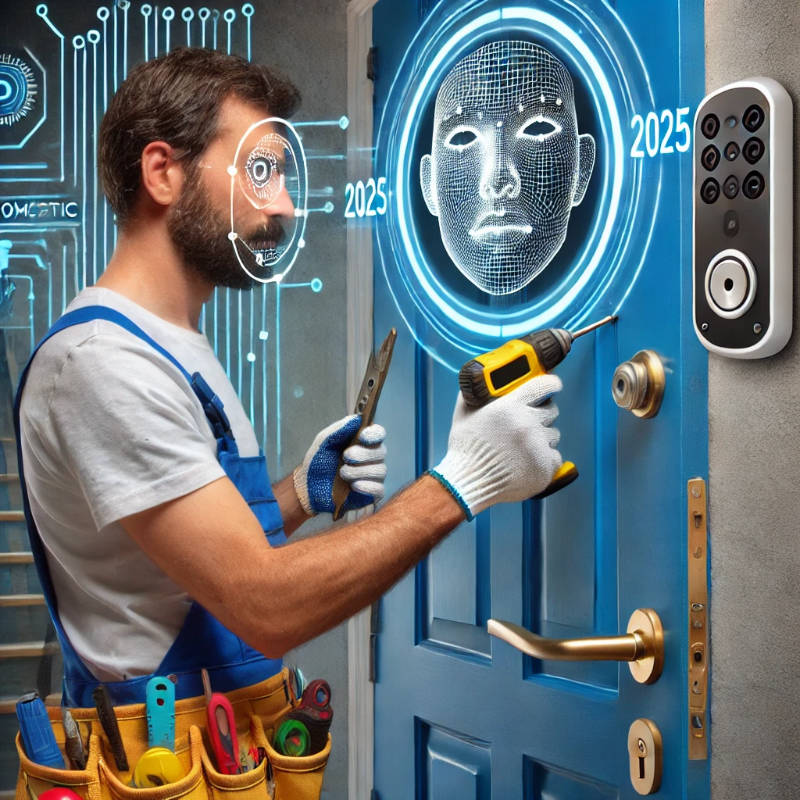
Key 2025 trends in biometric security:
- Facial recognition locks: These systems scan and identify users based on facial features, reducing the risk of unauthorized access.
- AI-powered threat detection: AI-enabled security systems learn from data patterns and can detect and alert homeowners or business owners about potential security breaches before they occur.
- Biometric safes and vaults: Biometric technology is being used in safes and vaults in addition to doors, adding an extra layer of security for high-value assets.
Locksmiths must become familiar with AI technologies and biometric systems to meet the rising demand for highly secure, user-friendly solutions.
6. Cybersecurity in Locksmithing
As locks and security systems become increasingly digital, locksmiths in 2025 will also need to act as cybersecurity experts. With smart locks and IoT-enabled devices, there is always the risk of cyberattacks that could compromise security.
Key cybersecurity trends in locksmithing:
- Securing smart locks: Locksmiths must protect smart locks against hacking by using encrypted communication channels and regularly updating software.
- Cybersecurity education: Locksmiths must educate clients on securing their digital access points and using strong passwords to protect against breaches.
- Collaborating with IT professionals: Locksmiths must collaborate with IT and cybersecurity professionals to create comprehensive, secure systems for large-scale installations.
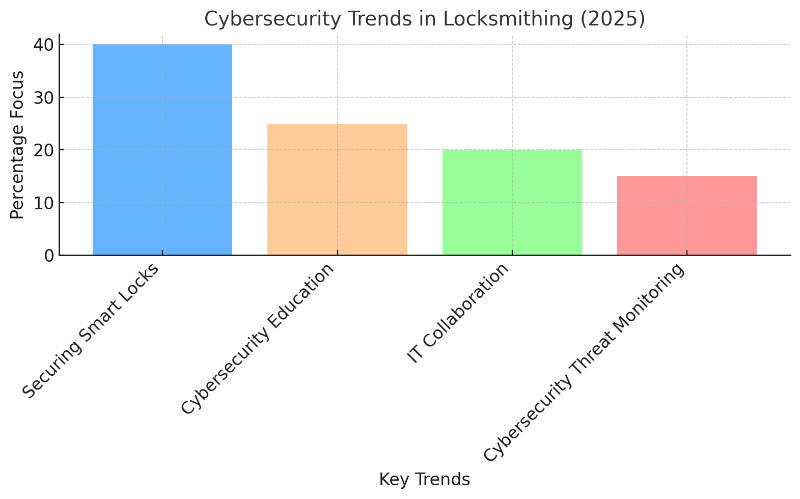
Locksmiths must stay informed on the latest cybersecurity threats and best practices to help clients secure their physical and digital assets.
7. Future-Proofing Locksmith Businesses
As the locksmithing industry evolves, businesses must stay competitive by embracing new technologies and diversifying their service offerings. In 2025, locksmiths must continuously invest in education, certifications, and technological tools to remain relevant in a fast-changing landscape.
Critical strategies for future-proofing locksmith businesses:
- Ongoing training and certifications: Locksmiths must stay current with certifications in smart lock technology, biometric security, and cybersecurity to meet client demands.
- Diversifying services: Additional services, such as home automation and security consultations, can help locksmiths broaden their client base.
- Technology investments: Investing in the latest tools, software, and systems will allow locksmiths to stay competitive and deliver high-quality service.
Locksmiths who adapt to these trends will position themselves for success in an industry increasingly dependent on technology and integrated solutions.
Additional Resources for Locksmith Professionals
For more information on locksmith certifications, technologies, and best practices shaping the industry in 2025, check out these authoritative resources:
- Associated Locksmiths of America (ALOA): Provides education, certifications, and resources for locksmith professionals to stay current with industry standards.
- Security Industry Association (SIA): Offers insights on the latest security technologies, cybersecurity practices, and industry trends in access control.
- National Institute of Standards and Technology (NIST): Explore cybersecurity best practices and encryption standards relevant to locksmiths working with smart lock systems and IoT devices.
- International Association of Investigative Locksmiths (IAIL): Focuses on investigative locksmithing, forensic locksmithing, and how locksmiths can diversify their skills in advanced technologies.
- Cybersecurity & Infrastructure Security Agency (CISA): Learn more about securing digital systems and protecting critical infrastructure in the age of smart technology and IoT.
- Electronic Security Association (ESA): Provides resources and certifications for locksmiths transitioning into electronic security services like biometric locks and smart home systems.
- International Organization for Standardization (ISO): Stay updated on international standards for security systems and locksmith practices, including sustainability in the industry.
Stay Ahead of 2025 Locksmith Trends!
Upgrade Your Locksmith Skills Now
Conclusion: The Future of Locksmithing in 2025
The locksmith industry is rapidly evolving, with new technologies, eco-friendly practices, and integrated security solutions at the forefront of the changes. As businesses and homeowners look for advanced, reliable security systems, locksmiths who embrace innovation will thrive in 2025. By focusing on smart locks, cybersecurity, and multi-layered security solutions, locksmiths will secure physical spaces and future-proof their businesses in an ever-changing market.

